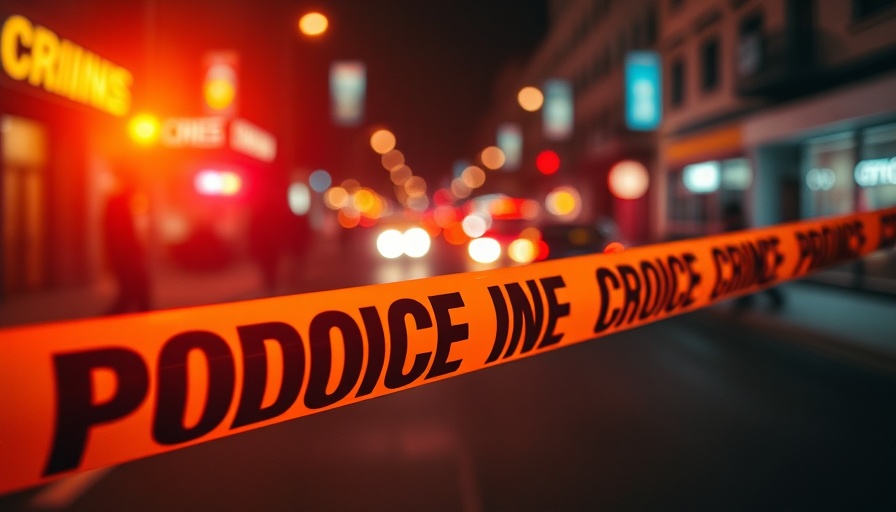
A Tragic Incident: The Killing of Langston Sykes
The recent shooting death of 31-year-old MMA fighter Langston Sykes has drawn considerable attention and controversy, particularly regarding Florida's 'Stand Your Ground' law. Sykes was shot during what police described as an attempted home invasion in Lake City, Florida, a situation that raises critical questions about self-defense and the implications of such legislation.
The Events Leading Up to the Shooting
According to Lake City Police, officers responded to a 911 call shortly after 11 p.m. on Tuesday in response to a reported shooting involving a break-in. Upon arrival, they found Sykes unresponsive. Despite immediate first aid efforts, he was pronounced dead shortly thereafter.
Initial reports from law enforcement indicate that Sykes allegedly attempted to enter a residence while families, including children, were present. When he entered and allegedly charged at the occupants, one of the adults in the home fired multiple shots, striking Sykes fatally. Notably, the resident had an active injunction against Sykes, suggesting a history that may have heightened tensions.
Understanding Florida’s 'Stand Your Ground' Law
The shooting incident has caught the public's attention in the context of Florida's controversial 'Stand Your Ground' law, which allows individuals to use deadly force in self-defense if they believe their life is in immediate danger. This law has been the focal point of various legal and ethical debates, particularly following cases involving perceived injustices surrounding self-defense claims.
The investigation into Sykes' death will consider whether the resident felt genuinely threatened and whether the use of lethal force was justified. Police Chief Gerald Butler labeled the incident tragic, expressing condolences while emphasizing the ongoing investigation into the facts surrounding the case.
Similar Cases and Their Outcomes
This incident is not isolated; other cases in Florida with similar circumstances have resulted in varying legal outcomes. For example, Joe Schilling, a former professional MMA fighter, was recently found to be acting in lawful self-defense by a Florida court. In Schilling's case, he faced accusations after defending himself from an aggressor but was ultimately deemed immune from civil suits under the same law that may apply in Sykes' case.
Such rulings showcase a legal landscape where self-defense is vigorously debated. As seen in Schilling's situation, the argument often hinges on the perceived threat levels and whether the defensive actions taken were reasonably necessary.
Community Impact and Reactions
The unexpected death of a local athlete like Sykes inevitably stirs deep emotional responses within the community. A local MMA school reflected on his contributions not only as a fighter but as a person, highlighting his character and dedication to his family. "Langston was not only a fierce competitor and a dedicated teammate but also a great father," said the school in a heartfelt tribute.
As the community processes this tragedy, the narrative surrounding Sykes' death is expected to remain contentious. Discussions about self-defense laws, public safety, and community rights will likely dominate local and national news cycles in the coming weeks, underscoring the emotional stakes involved.
The Broader Implications of 'Stand Your Ground'
Discussions surrounding Florida's 'Stand Your Ground' law often highlight the thin line between safety and violence. Advocates of the law argue that it empowers individuals to protect themselves without fear of legal retaliation, while critics raise concerns that it may encourage unnecessary violence.
This tragic event may reignite calls for a reevaluation of such laws. Activists, policymakers, and civic leaders are already expressing their desire for a deeper examination of legislative impacts on community safety and personal responsibility.
Where Do We Go From Here?
As investigations continue and community members mourn, the lingering question remains: How does society balance the right to self-defense with the imperative to prevent violence? Ensuring justice for those involved, while maintaining a fair perspective on the law, will be essential for the community moving forward.
This incident invites not just legal scrutiny but also a reflection on the cultural and environmental factors that contribute to such confrontations. What lessons can be drawn from this occurrence as we move toward a future emphasizing safety and justice?
 Add Element
Add Element  Add Row
Add Row 



 Add Row
Add Row  Add
Add 


Write A Comment